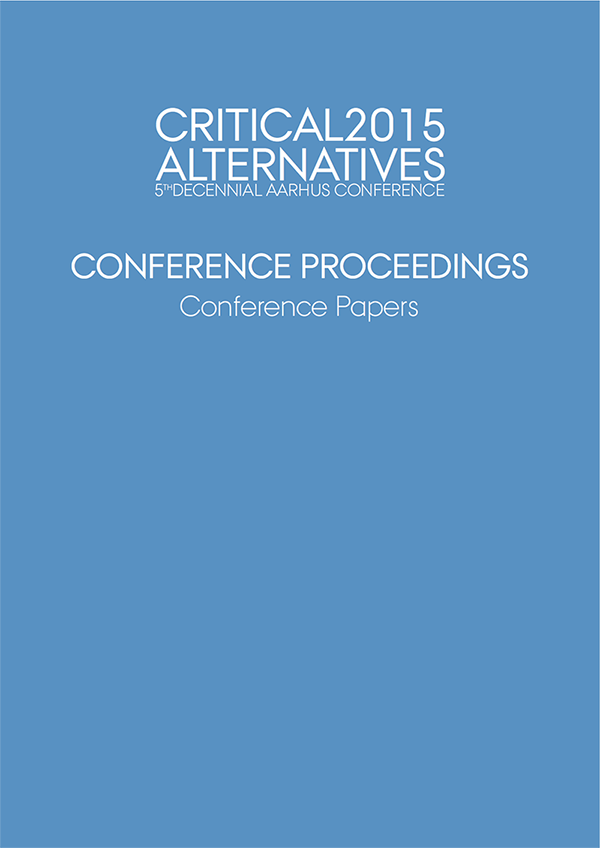Computing and the Common. Hints of a new utopia in Participatory Design
DOI:
https://doi.org/10.7146/aahcc.v1i1.21318Keywords:
Participatory design, commons, common, utopiaAbstract
In this statement, I draw upon the need of Participatory Design to engage with new utopias. I point to contemporary critical theories and to concurrent social conditions that make possible to identify the construction of the common as a possible utopia. In conclusion, I suggest that forms of community-based participatory design could be actual practices supporting such utopia.
References
Allegri, G. and Ciccarelli, R. Il Quinto Stato. Perché il lavoro indipendente è il nostro futuro. Precari, autonomi, free lance per una nuova società. Ponte alle Grazie, Milan, 2013.
Bauwens, M. The political economy of peer production. post-autistic economics review, 37 (2006), 33–44.
Benkler, Y. Practical Anarchism Peer Mutualism, Market Power, and the Fallible State. Politics & Society 41, 2 (2013), 213–251.
Castrataro, D. and Pais, I. Analisi delle Piattaforme Italiane di Crowdfunding. Italian Crowdfunding Network, 2014.
Clement, A., McPhail, B., Smith, K.L., and Ferenbok, J. Probing, Mocking and Prototyping: Participatory Approaches to Identity Infrastructuring. Proceedings of the 12th Participatory Design Conference: Research Papers - Volume 1, ACM (2012), 21–30.
Dearden, A., Walker, S., and Watts, L. Choosing Friends Carefully: Allies for Critical Computing. Proceedings of the 4th Decennial Conference on Critical Computing: Between Sense and Sensibility, ACM (2005), 133–136.
DiSalvo, C., Clement, A., and Pipek, V. Participatory design for, with, and by communities. In J. Simonsen and T. Robertson, eds., International Handbook of Participatory Design. Routledge, Oxford, 2012, 182–209.
Ehn, P. Scandinavian design: On participation and skill. In P.S. Adler and T.A. Winograd, eds., Usability. Oxford University Press, Inc., 1992, 96–132.
Fuchs, C. Digital Labour and Karl Marx. Routledge, 2014.
Halskov, K. and Brodersen Hansen, N.. The diversity of participatory design research practice at PDC 2002–2012. International Journal of Human-Computer Studies 74, 2015 81–92. http://doi.org/10.1016/j.ijhcs.2014.09.003
Hardt, M. and Negri, A. Commonwealth. Belknap Press, Cambridge, Mass, 2009.
Harvey, D. Seventeen Contradictions and the End of Capitalism. Oxford University Press, Oxford; New York, 2014.
Marttila, S., Botero, A., and Saad-Sulonen, J. Towards commons design in participatory design. Proceedings of the 13th Participatory Design Conference, ACM (2014), 9–12.
Marttila, S. and Hyyppä, K. Rights to remember?: how copyrights complicate media design. Proceedings of the 8th Nordic Conference on Human-Computer Interaction: Fun, Fast, Foundational, ACM (2014), 481–490.
Marttila, S., Nilsson, E.M., and Seravalli, A. Opening Production: Design and Commons. In P. Ehn, E.M. Nilsson and R. Topgaard, eds., Making Futures: Marginal Notes on Innovation, Design, and Democracy. The MIT Press, Cambridge, MA, 2014, 87–98.
Morini, C. and Fumagalli, A. Life put to work: Towards a life theory of value. Ephemera: theory & politics in organization 10, 3/4 (2010), 234–252.
Ostrom, E. Governing the Commons: The Evolution of Institutions for Collective Action. Cambridge University Press, 1990.
Rete Cowo. Tutti gli spazi Cowo, città per città. 2015. http://www.coworkingproject.com/coworking-network/.
Seravalli, A. Making Commons: attempts at composing prospects in the opening of production. 2014.
Sestini, F. Collective awareness platforms: Engines for sustainability and ethics. Technology and Society Magazine, IEEE 31, 4 (2012), 54–62.
Shapiro, D. Participatory Design: The Will to Succeed. Proceedings of the 4th Decennial Conference on Critical Computing: Between Sense and Sensibility, ACM (2005), 29–38.




